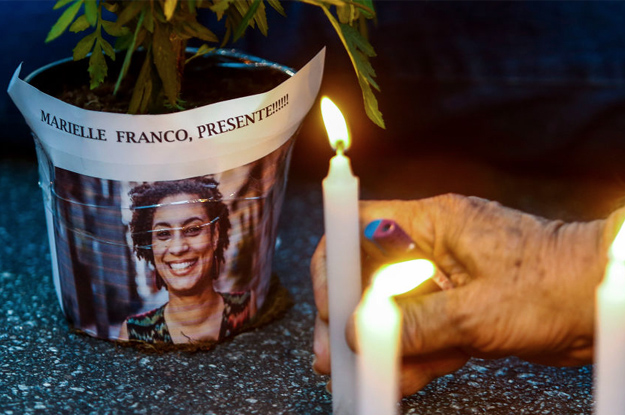When Marielle Franco’s supporters elected her to Rio de Janeiro’s city council in 2016 with the fifth largest number of votes, even they were surprised by how well she did. Many couldn’t believe she’d won at all.
It was Franco’s first time running for the office. She was also young, at 37 years old, and a black, queer woman from one of Rio’s biggest favelas, the Complexo da Maré.
Franco represented a “growing movement of young people from favelas, who want to create a space for themselves in politics,” said Eliana Sousa, a director at Redes da Maré, one of the biggest NGOs in Complexo da Maré.
She was a rarity in Brazil: a fresh face with a solid base in a country struggling to renew its political leadership in the midst of an unprecedented economic and political crisis. During her 15 months in office, Franco introduced 16 bills, one of them to offer city-subsidized childcare at night for working single mothers like her.
But Wednesday night, as she left an event aimed at empowering young black women, Franco was murdered with point-blank shots to the head. Her driver, Anderson Pedro Gomes, was also killed.
While the motives of her murder remain unclear, Rio’s police are investigating her death as an execution. Nothing was stolen, and the murderers, the police said, knew where she was sitting in the car.
Franco’s death was shocking even for a city that is accustomed to violence, and for a state where more than 18 people were murdered per day last year. Tens of thousands mourned her on Thursday, gathering in vigils in Rio and São Paulo.
Human rights advocates saw her murder as the result of failed security policies.
“(Franco’s Murder) is really a signal of the climate of impunity,” said Cesar Muñoz, a senior researcher at Human Rights Watch. “They think they can get away with it.”
Many of her supporters also feared that recent militarization of public security in Rio and tough-on-crime rhetoric from national political figures in the run-up to presidential elections would make conditions worse for people like Franco – black, working class, female, gay.
Last month, President Michel Temer announced the government would fight violence in Rio by calling on the military to take over public security. Franco and her party, the PSOL, had been highly critical of the president’s decision, which many considered politically motivated and likely to increase violence against favela residents. Franco had been named rapporteur of the city council’s commission to oversee the military presence.
Jair Bolsonaro, a national legislator for the state of Rio de Janeiro and a leading candidate to become Brazil’s next president, is known for his history of racist, homophobic and misogynist remarks. His defense of torture and his promises to fight crime by giving police carte blanche to shoot have only increased his appeal.
“Bolsonaro’s speech is the speech that gives a license to kill, that creates militias, that produces this promiscuity between crime and the police,” said Bruno Paes Manso, a researcher at the center for studies of violence at the University of São Paulo.
In the months leading up to the 2016 elections that brought Franco into city government, at least 14 candidates and politicians were killed in Baixada Fluminense, a group of cities in the working-class suburbs of Rio de Janeiro. Favela leaders are also commonly targeted. Osmar Camelo, a community leader in Complexo da Maré, the same favela where Franco grew up, was murdered in 2014 after publicly showing support for an army occupation. Murders of LGBT Brazilians rose 30 percent in 2017.
It was in this context that Franco spoke up for human rights. After police killings reached a 15-year high in January, at 154 deaths in that single month, she questioned the impunity of law enforcement – right until she was murdered. Her last post on Twitter asked, “How many others will have to die for this war to end?”
Despite the risks Franco faced, many of her supporters had hoped her position and her popularity would protect her. “We have this belief that the more we speak, the more we get exposed, the more we are protected,” said Sousa, of Redes da Maré. “Her death leaves us completely perplexed.”
On March 15, thousands gathered by the steps of Rio de Janeiro’s city council under the blazing summer sun to mourn Franco’s death. Many cried as they demanded a thorough investigation and promised to fight back.
“In her place, thousands will rise,” they shouted.
Several wore a badge saying “Marielle, Presente,” a warning that while Franco may have been taken from them, her struggle remains very much alive.
—
Andreoni is a journalist based in Rio de Janeiro








